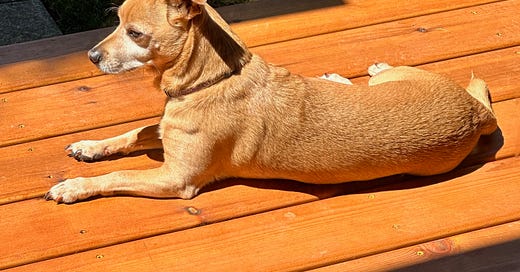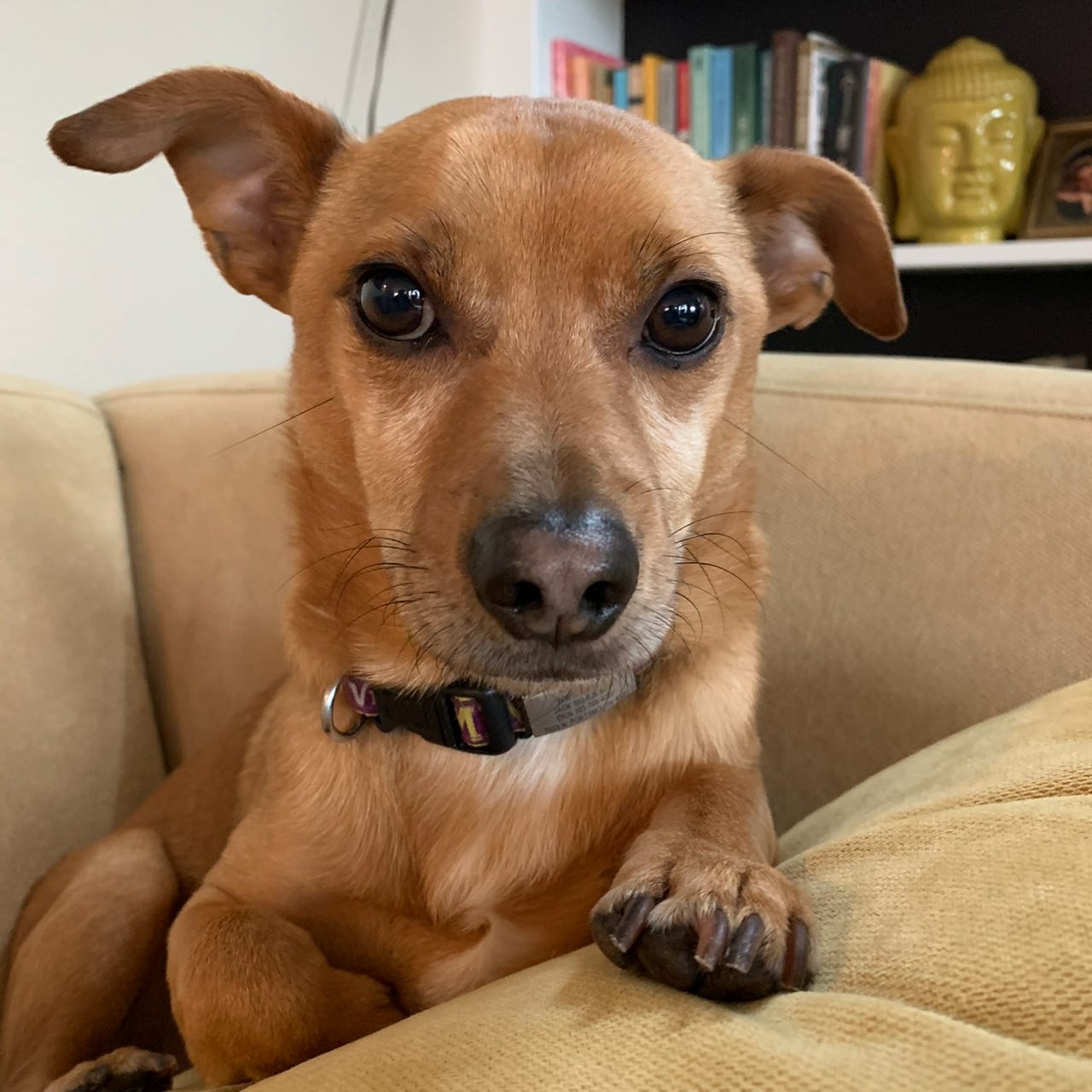Dogs...The Love That Comes Into Our Life And Leaves Far Too Soon
If we pay attention, though, we can learn the lessons they're sent to teach us
At the end of a life, there are really only two questions that matter: Did you love, and were you loved.
Like many introverts, I often find myself liking animals more than people- and when I say “animals,” I’m usually referring to dogs, though I’ve always had a soft spot for cats. But while cats often have a specific and well-defined agenda that may or may not include their owner, dogs are utterly guileless. They have no agenda, and while they may not be as “smart,” conniving, or, yes, evil as some cats may be, as companions, they have no parallel.
The problem is that these companions lead comparatively short life spans, meaning that if we welcome a dog into our life, we will almost certainly outlive it. And saying goodbye to a canine companion has always been something akin to having my heart ripped out.
Magnus, the Chiweenie who came into our lives just after Erin and I were married in 2015, has become the welcome third wheel we never knew we needed. I’d resisted getting a dog for years because of the added responsibility (What part of irresponsibility doesn’t work??).
Finally- inevitably- Erin wore me down (she has a way of doing that), and so I agreed, though I tried to be cautious about actually meeting dogs because I knew she’d fall in love with the first dog we met. And that’s precisely what happened. Magnus was the first dog we met, Erin fell head over heels in love, and I wasn’t far behind her. He was three years old when he came home with us, and his paperwork traces him back to the L.A. County Humane Society.
We often wonder what his first three years were like, but we cannot know. Food must’ve been hard to come by; Magnus is the most food-drive animal I’ve ever seen.
So, for almost eight years, Magnus has been the 20-lb. son we never had. He’s a serious Mama’s boy and always starts the night out sleeping on Erin’s side of the bed. He’s sitting on her lap or by her side while we’re watching television. In the morning, he’s sitting with her in the living room.
When Erin’s traveling on business, Magnus hangs with me, but I can tell it’s not quite the same for him; he misses Erin, and while I’m a serviceable substitute, he misses his Mama.
Occasionally I think about what life would be like without Magnus. There was life before him, but it’s difficult to remember. Contemplating life without him is an awful thing to think about.
So it was with some considerable sadness that I read about Jay Kuo losing his dog, Hudson, while they were away on vacation. Reading his post brought me to tears as I thought about what it might be like if we were to lose Magnus similarly.
When you adopt a little angel into your life, you know that there will eventually come a day of great heartbreak, of crushing grief, when you have to say goodbye. I knew that when I first held Hudson in my arms, and I accepted it as the cost. I just didn’t know that day would come so tragically and so early.
On Thursday evening, while we were still away, Hudson got into a bag of jerky that was left out accidentally. She has always loved her food and her treats, and she didn’t understand the danger that bags can pose to little dogs like her. By the time she was found, it was too late. I got the devastating news while we were away, and we are heartbroken beyond words. It has taken me a few days to be able to write anything at all.
Hudson never knew an unhappy day in her short life of just three and a half years. She came into our lives just before pandemic and loved being our little girl through lockdown.
She was always ready to play whenever she wasn’t tuckered out from all the fun. My best memories of her were traveling three times to Mexico, walking the beach each morning, and morning cuddles, at which she was an expert.
A short time after Magnus came into our lives, we spent a long weekend at a dog-friendly hotel in Long Beach, WA. We went for a walk on the beach on our first morning, and both of us were nervous because we had no idea how Magnus would react. We wanted to let him run because he had so much energy…but would he return to us, or would he keep running, never to be seen again?
After a few minutes of walking him on a long leash, we decided the moment had come to take the risk. We turned him loose and watched him dash down the hard-packed sand. He became smaller…and smaller…and smaller until he was a barely-perceptible dot maybe a third of a mile down the beach.
Then he stopped, turned around, jumped up and down for a few seconds, and sat on his haunches. We called out to him, and he set out in our direction at a dead sprint. A few seconds later, he flew by us at full speed, stopped, turned around, and trotted back to us, his tongue hanging out and a look of pure dog joy on his face.
OK, so we were imprinted on him (at least to the degree that he knew we were the ones who fed him), and the first test had been passed. We let him run on the beach for another hour or so, and then we returned to our hotel room, where he slept most of the afternoon.
In the beginning, he was either full-on or off. There was no cruise control with him. We installed an electric fence in our front yard because he habitually bolted toward a city park two blocks away. He just wanted to run, which was a problem in that the park was across one of the busier streets in our neighborhood.
Hudson wasn’t just my constant companion, she was my teacher. Through her eyes I got to see the world unfold minute by minute, each moment an opportunity for big smiles, snuggles, and games. She taught me to slow down and just be, to feel the magic and simplicity of unconditional love and devotion, to appreciate the obligation and the honor of taking care of another.
Magnus has similarly taught me much about how to relax and enjoy life. He can be a wonderfully perceptive companion. Shortly after we brought him home, Erin was in Kansas City visiting a friend, and I was having a rough time emotionally. I’ve long since forgotten what was weighing on me, but Magnus sensed my mood and spent most of the weekend glued to my side. It made a trying weekend much less burdensome.
One nightly ritual I share with Magnus is letting him wash my head with his tongue. I don’t remember how it began, but he enjoys it immensely (it grosses Erin out). Since I’m bald, it feels strangely relaxing, though there’s something decidedly odd about a dog sticking his tongue in your ear.
Sometimes Magnus will wake me up by licking my head, which I don’t appreciate nearly as much, but when the boy wants to play, it can be difficult to ignore him. I won’t repost the photos of Hudson that Jay Kuo included in his post. Under the circumstances, that feels voyeuristic. I’d highly recommend reading the post to see the pictures because they’re adorable. Kuo obviously adored Hudson…and the affection was mutual. I won’t speculate on the pain he must be feeling because doing so would force me to dig a bit too close to a vulnerable place in my own heart.
As an atheist, I don’t believe in God or angels, but dogs would be their manifestation on Earth if angels did exist. We welcome them into our lives, allow them into our hearts, make them part of our families, learn the lessons they have to teach us, and then say goodbye, almost always far too soon.
I’ve listened to people debate whether animals have souls. While that’s one of the more pointless debates I could imagine, I’m here to tell you that dogs have souls. Their capacity for love is boundless, their perceptiveness uncanny, and their ability to entertain magical. They’re pure joy on four legs.
Our lives are richer for the dogs we welcome into them…and poorer for the ones we lose. But magic doesn’t- and can’t- last forever, so our task is to treasure the magic we have while we can. Treasure the moments you have while you have them, for one day, they will leave you.
Such is the circle of life.
And at the end, the only question truly worth asking will be, “Did you love, and were you loved?”







I have elderly clients who depend on their dogs and cats for company and who would otherwise be suffering from social isolation.